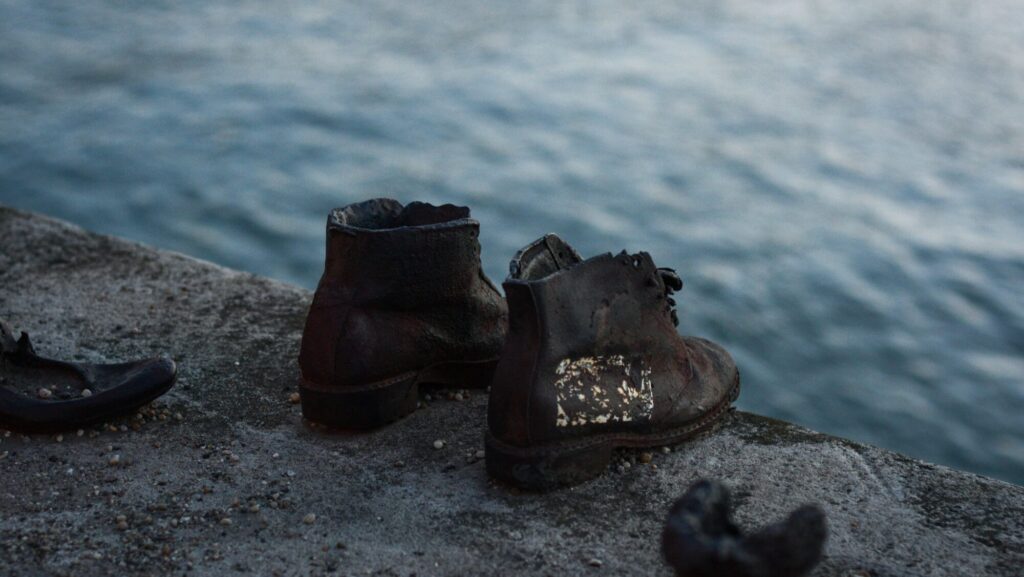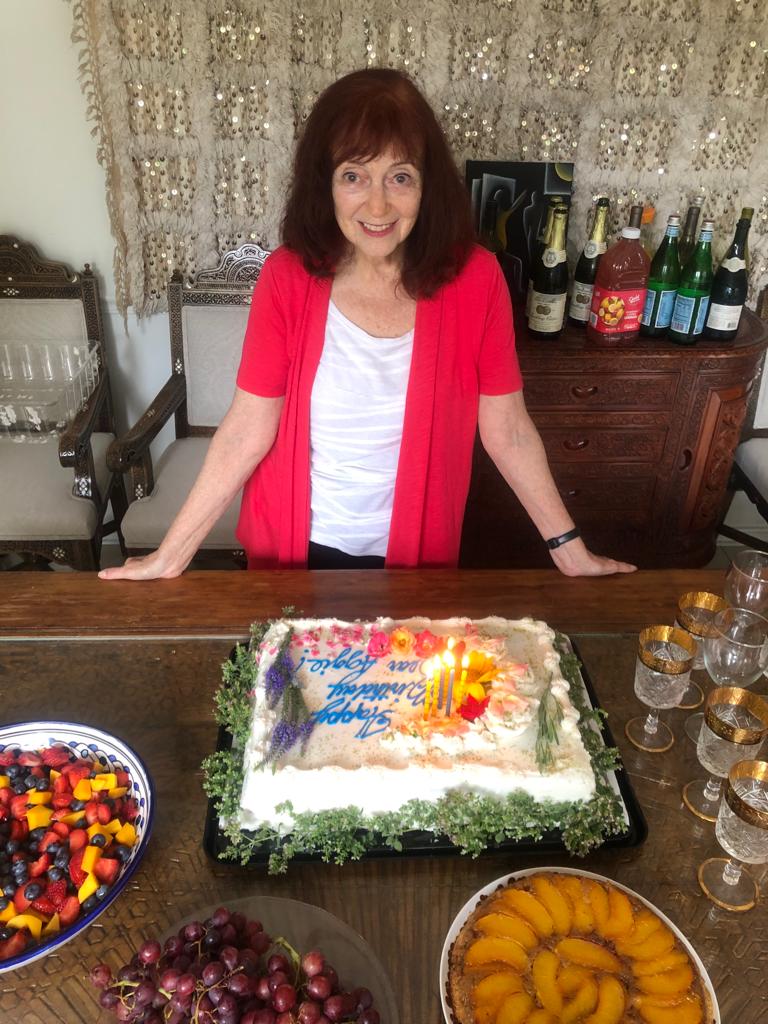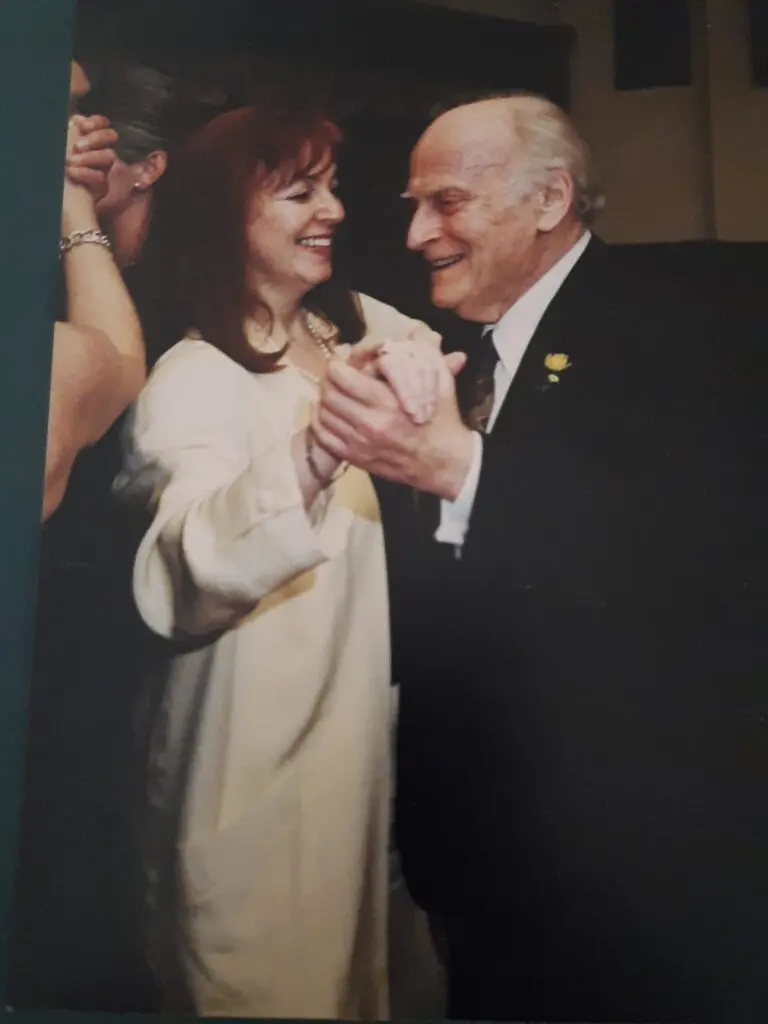
Shoes on the Danube in memory of Jewish victims
Photo by Sukanya Basu on Unsplash
On October 23, 1956, the Danube flowed through a city teeming with revolutionary spirit. It was an unseasonably warm day, and the Hungarian people were in the streets of Budapest in defiance of communism. Thousands swelled to hundreds of thousands as the citizens of Buda and Pest crossed the city’s famous bridges to march for freedom—students and old men, housewives and children, veterans and poets all joined the rising. Keeping pace astride them was a diminutive twelve-year-old redhead, an only child whose immediate and extended family except her mother were dead, murdered by the Nazis within months of her birth in August 1944. She knew little of their lives or deaths, only enough to realize, even at a young age, that her own life was itself improbable. So she chose to witness as much as she could.
She heard the cries of freedom in Hungarian, the only language she knew then, even if she didn’t grasp entirely the historic moment that she was witnessing. The events of that day led to her eventual flight from Hungary. Her new life would acquaint her with many new peoples and languages: German, French, English, Romanian, and eventually Hebrew—the recently resurrected language of a nation reforged in the fourth year of her life. She knew little of those tongues, much as she knew nothing of how her father had perished. But on that autumn day in 1956, before the Russians came, many things seemed possible for Hungary and the girl.
“The streets were full; there were many armed men,” Aggie Madaras Kuperman says more than half a century later in America, seeing those events again through the child’s eyes. She followed her countrymen to City Park that day and watched Hungarians topple the statue of Josef Stalin. “I wanted to see everything. I was fearless—then and most of my life. I guess because I thought every day was a gift. I could’ve died in the Shoah with everyone else.”
Aggie rushed home that evening so that her mother wouldn’t return to an empty apartment on the Pest side. “In truth, I was a latchkey kid,” she says. It had been twelve years since Aggie’s father, István, had been taken by the Nazis in the late autumn of 1944. Adolf Eichmann arrived in Budapest that year to personally oversee the deportation of Hungary’s Jews. That month, soldiers of the Arrow Cross, Hungary’s fascists, marched thousands of Jews and other Hungarians to the banks of the Danube, forced them to remove their shoes, and shot them. Their bodies fell or were thrust into the river; the cries of the still-living went mute beneath the surface as they bled out and froze; the cold water closed around them, a flowing tomb that absorbed the blood of the living and dead as each was pulled under and vanished, including many children like Aggie.
But the Nazis never found the wife and daughter of István Madaras. Aggie’s mother emerged from hiding to see the Nazis driven out and then awaited the return of family: brothers or sisters, nephews or nieces, aunts or uncles, or even cousins. Above all, she hoped for the return of her beloved husband.
“My father loved classical music,” Aggie recalls. “He was a talented musician. He played in a quartet with three other Hungarian doctors.” She recounts one story she heard from her mother. “Before the war, he treated a family of Roma who were unable to pay. They found a radio station he listened to, performed in its studio, and dedicated it to him on the air. That’s the kind of man he was—beloved.” But neither he nor any other close family member returned. Only distant cousins remained, and these became, over time, like close family. Fifty million people were dead across the world, six million of them Jews, one of them István Madaras.
The Danube flowed on. Fascist Hungary became communist Hungary. Russian liberators quickly became occupiers, leaving behind a Soviet-dominated government in Budapest. “My mother told me from a young age, ‘Whatever you hear at home, you don’t repeat it outside.’ It was a schizoid life, learning one thing at home and another at school.” Soon after the 1956 uprising, Aggie and her mother watched Russian troops return and crush the rebellion. Two couples from next door moved in with them after half of the apartment complex was destroyed by Russian tanks. Her mother still went to work. “We were poor and needed the money,” Aggie recalls. On November 12, Aggie learned that the last train for Vienna was leaving that day and phoned her mother to say that she felt sick and to come home. When her mother arrived, Aggie told her that they had to leave. Her mother listened and was persuaded. It was only the two of them left in the world, and her child had already grown up quickly. They packed what they could carry and left with others from the apartment. “I took my father’s diploma,” Aggie recalls. “I’m not sure why.”
When they arrived at the train station, the last train had already departed, but their small group got a ride with a truck driver headed toward the border crossing with Austria. The driver managed to get them through a Russian checkpoint. They stopped near the border and continued on foot before a farmer conveyed them on a horse-drawn carriage. When the farmer heard gunshots, he forced them off and abandoned them by the roadside. Hungarian soldiers soon took them into custody at a local barracks, with plans to return them to Budapest the next day. “Someone has to rebuild the country,” one of the soldiers told them. Resigned to their fate, they slept. “We thought this is fate. We tried.” In the night, a young Hungarian soldier entered and woke them up. “If you really want to go, come with me,” he said. They went. As they walked out, the young soldier said, “I can’t take you across, but I will show you where to go. You’ll hear gunshots. When you do, drop to the snow and wait for them to stop, and then keep going. Be careful of the mines.” “We had no idea what mines were,” Aggie recalls with a laugh.

As a child, she often expressed fear by giggling. As they trudged through the snow in the darkness, hearing border patrols nearby, she began to giggle. One of the men in their party covered her mouth. “My mother was furious and ordered him to take his hands off me.” Moments later, there were shots. They did as the soldier had instructed, dropping into the snow and mud. When the shots stopped, they rose and went on, wet and shivering—into small boats and onto Neusiedl Lake. Halfway across, the wife of one of the men fell in. “The husband said that we should leave his wife to drown and keep going. We had to take her fur coat off and pull her into the boat.” More than half a century later, she’s disturbed by the retelling of the experience—the proximity of charity and cruelty, humanity and inhumanity. “I’ve never gone back to the place where we crossed.”
The refugees were greeted on the other shore by Austrian farmers. “They were so kind. They took us to different houses. We ended up in a peasant home that smelled like fresh bread and had some of the best hot chocolate. The thing that I remember most to this day is my blanket and pillow and featherbed. That farmer’s house had the most comfortable bed.” The next day, they went to Vienna, where they were welcomed at the home of her mother’s contacts. “The Pitsch family. I still remember the address: Fleischmarkt 14,” she recalls. “Vienna was magical. My mother and I put our noses to the glass of shops that we passed, looking at all the food. I’d never seen oranges or bananas or chocolate. They gave us everything. They even hemmed a dress for my mother.”
Four decades passed before another revolution swept Europe and brought down communism. When it did, the little redhead was there to witness that too—the citizen of another nation of which she was a senior diplomat, speaking a new language with another surname, shepherding others across the same Danube, the same fearless child.
In January 1957, Aggie and her mother arrived in Newark, New Jersey, and began the hard task of beginning a new life in a new world. “My mother was my rock and the center of my life,” Aggie recalls. Aggie was enrolled at an inner-city school, and in the years that followed, she mastered English and excelled academically. She graduated from Rutgers and later the University of Indiana and married a professor. They both took jobs with the University of Maryland to teach U.S. military personnel at European bases, including bases in Germany. There, Aggie came to know some Germans of her generation—soixante-huitards (‘sixty-eighters’)—who protested the presence of former Nazis in Germany’s public culture. “I never blamed my generation for what happened. They’d done nothing wrong.”
Nazi Germany had been at once modern and industrial yet also ancient and pagan—a nation unified around a primitive political cult that made an idol of race. It was as if the Amalekites of Exodus, “the enemies of the Lord,” had marched into modern history, a seemingly spiritual evil not easily explained in strictly rational terms. Throughout Hebrew scripture, there are scattered reminders that each generation will bring new Amalekites. God said to Moses, “You shall blot out the name of Amalek from under heaven. Do not forget.” Again: “Remember what Amalek did unto thee by the way, when ye were come forth out of Egypt,” for “Amalek will rise against the Lord in every generation.” She will not utter the name of the place in Germany where her father perished.
While in Germany, she would, however, at times speak words both to the murdered loved ones she never knew and to those who made her an orphan: “I’m here”—in Hebrew, hineni, which is closer to “Behold, I’m here.” Sometimes aloud, sometimes in silence. It was a declaration of survival, a witness, words to her own beloved dead—and perhaps a reminder to the Amalekites and the Arrow Cross, to Führer and Pharaoh on their own land, to the past and present: “I’m here.”
Aggie took the Foreign Service exam in 1978 and was sworn in as a diplomat the following year. Her first posting was in Iran. She arrived in 1979 in a country ruled by the Shah. When she was evacuated later that year, days before the U.S. embassy was stormed, Iran was governed by Ayatollah Khomeini. Her colleagues were taken hostage. Aggie was sent to Pakistan, where months later she was forced to leave yet another post after the embassy was stormed and destroyed—again losing nearly everything she owned. Through all of it, she went to great pains to spare her beloved mother anxiety. The following year, she returned to the State Department headquarters in Washington, D.C.
“Why didn’t I get out of the Foreign Service then? I wonder sometimes what’s wrong with me,” she asks. The moment of introspection is marked by doubt, the unanswerable question common to survivors: What’s wrong with me? She remained in the Foreign Service, however, and retained her lifelong knack for postings in times of upheaval.
Aggie’s career progressed in the ‘80s and ‘90s. She was promoted to the Senior Foreign Service. After a tour in Tunisia, she served in Romania. She became fluent in Romanian and, in 1989, was made spokesman for the embassy. That fall, citizens across the Soviet bloc rose up against communism. In November, the Berlin Wall fell. There were fears that the bloody regime of Nicolai Ceausescu would crush any Romanian uprising, as had happened in Hungary in 1956.
Aggie played a key role in the evacuation of Americans and her fellow diplomats from Romania. She also knew that the Israelis had many students in Romania and contacted their embassy to assist with the evacuation efforts. She then organized and led a convoy of 25 U.S. and ten Israeli vehicles to the Bulgarian border crossing on the Danube. There, she watched the Americans and Israelis cross, got back into the lead vehicle with the Marine driver, and returned to the embassy. In the days that followed, she witnessed the collapse of communism in Romania.

She returned to Germany, now a cultural affairs officer, and worked for the ambitious and widely disliked Ambassador Richard Holbrooke, whom she defends tirelessly to this day. “I know people don’t like him, but he was a true visionary.” Holbrooke’s approval wasn’t easily won, but he thought highly of Aggie. When Holbrooke spearheaded the Dayton Accords and intervention in Bosnia, Aggie served as spokesman in Sarajevo for the U.S. diplomatic effort. Six years after witnessing communism fall in Romania, Aggie went to Bosnia as that war and its genocide—the first in Europe since her infancy—were brought to an end (at a chance meeting this author had with Holbrooke in Munich in 2010, a few months before his sudden death, he recalled her fondly.) But it was the approval of the man she’d never met that she sought most.
For Aggie, the question of her own life’s meaning was bound up with her father: the loving husband, the physician, the musician; the presence of the man she’d never met, whose blessing she sought, though that blessing often seemed elusive. “There was always the sense that I wasn’t good enough,” she says. “That I didn’t live up to his expectations.” The imagined yet unbearable expectations of a man who set a standard for virtue, excellence, and goodness through her dear mother’s memory couldn’t be matched. The tender husband, the compassionate physician, and the gentle aesthete remembered fondly by her mother was for Aggie a brooding judge who observed her in silence and whose silence seemed to confirm that none of her deeds were sufficient.
It’s common for survivors and their children to be burdened by the question, “Why am I here while everyone else is dead?” Aggie struggled with that question, especially as a young woman. “I heard stories about how wonderful all those who’d perished were. I thought, How can I measure up? I felt unworthy.” Millions of Jewish survivors were burdened with the shame of their mere existence, of surviving when others hadn’t. Many, afflicted with that burden, later took their own lives. “Some people debate the number six million,” she says, followed by a long silence. “Let me tell you, the actual number was much higher.”
It was in Israel that she encountered others who shared her experience of survival. It was also in Israel that she encountered in an unexpected way the memory of her father who died nearly thirty years before—an encounter that complicated her relationship with István Madaras.
“It was my ex-husband’s decision to go to Israel,” she says. “He went to Israel to teach at Tel Aviv University. I was a dutiful wife and left my Ph.D., and followed h.m. We went together. It was one of the greatest experiences of my life. I didn’t know what Israel was like. I wasn’t raised very Jewish, let alone pro-Israeli.” Her mother had relatives there in 1956, but the economic and security situation was so dire that they told her not to come. Fifteen years later, as an American citizen, Aggie went for the first time.
Israel meant very little [to me] until I went there. Suddenly, I felt like a complete person. I felt like myself. I didn’t have to be a Jew to the world, create a positive image, [and] put on a show. In Israel, if I wanted to tell someone off, I could. I felt complete as a human being. I felt totally free. It’s a tough place; there are many problems, but this is how I felt.
Israel is a home for millions of Jews from Syria, Yemen, Uzbekistan, Germany, America, Russia, and Morocco, mostly the descendants of refugees from the Middle East and Europe. Israeli Jews range from the devoutly religious to the deeply secular. But almost all Israelis freely honor the Sabbath. “The wonderful thing about Tel Aviv on the Sabbath is that friends and neighbors will just walk through the door. They might not even knock. They just walk in.”
As the sun went down on the Mediterranean one Friday afternoon in 1972, as all of Tel Aviv rushed to finish their shopping for Shabbat, Aggie left work at Tel Aviv University and ran into two old friends of her mother, a husband and wife from Hungary. “The man looked awful. He was in pain. So I had to find a Hungarian doctor.” Aggie’s Hebrew then was only good enough to guess at a Hungarian name in the phone book, and off they went to a doctor’s office on Dizenghoff, a few blocks away.
When they entered, the Hungarian physician, Dr. Gal, greeted them brusquely. “Do you realize the time? It’s almost Shabbat.” Aggie replied that her elderly friend needed attention. “What’s your name?” he asked her. “Why don’t you take care of my friend and not worry about my name?” Aggie said. The doctor treated the friend but resumed his questioning as soon as the elderly man began to feel better. “What’s your name?” he asked again. “Kuperman,” she answered. “No, your Hungarian name.” When she said, “Madaras,” the color left his face. “Are you the daughter of István Madaras?” When she said that she was, the doctor fell back into his chair and wept. As women across Israel lit candles for Shabbat, Aggie listened as a stranger told her of her father’s fate many years before.
Dr. Gal had been one of the four doctors in István’s quartet, friends from the same Jewish hospital in Budapest where Aggie’s father was a pediatrician. They had been rounded up by the Nazis on the same day in November 1944. Months later, shortly before the Allied liberation, the doctor and István were on a forced march to a death camp in Germany. Gal and a few other companions saw an opportunity to dive into the bushes by the roadside and escape. As they weighed the matter, Aggie’s father asked, “But who will take care of the prisoners? They’ll have no doctor.” István then explained that he believed it was his duty to remain with them. Gal and a few others escaped, while István continued on the march with the other prisoners to Germany, to a death camp, into that man-made Sheol. He had chosen to comfort others doomed to die at the hands of the Nazis in their final days rather than escape.
As she listened nearly thirty years later in Tel Aviv, a coldness entered Aggie’s heart. He chose strangers over his own daughter, she thought. He was given the choice of life or death, and he didn’t choose life. “He was the greatest friend I had,” the doctor continued. She looked at him too with bitterness: Why is this man here and my father dead? When Dr. Gal concluded, she sat for a while in silence. She couldn’t see his heroism, only his neglect. Her reaction was that of an abandoned child: he had chosen strangers—and death—over Aggie and her mother. In that choice, he’d made her an orphan. That Shabbat and long afterward, she reflected on her father’s decision, on the years they might have shared, and sacrificed for the love of strangers. “I never saw the doctor again,” she said. “It took me several years to come to peace with what I learned that night.”
“I always regretted not going back to meet with him again. I was so angry that he survived and my father didn’t. I was angry at my father for saying that one of us had to stay in case they needed a doctor. Then I forgave both. I wish I’d gone back. It was just too much for me at the time.”
In 2019, Aggie and I had lunch at the State Department cafeteria. She told me how she’d recently had her purse and money stolen at a Washington, D.C. hotel while taking a group on tour. She brooked no pity and, with a wave of the hand, said, “You know, my mother used to say to me, ‘Think about what you and I have been through. If it’s a problem that can be solved by money, it’s not a problem.’ So, this isn’t a problem.”

Today, despite the rise in antisemitism since October 7 around the world, Aggie continues to look ahead. “The past is gone. There’s only the future.” She keeps a schedule that would exhaust a person half her age: taking international visitors on tours of the U.S. for the State Department, volunteering with Jewish and other civic groups, traveling to Israel and Hungary (where she’s worked with the Holocaust Museum to recognize a Hungarian priest who helped Jews survive by forging baptismal certificates), and administering a scholarship in her father’s name at the Technion-Israel Institute of Technology, founded a century ago with the help of Albert Einstein. She has already visited Israel this year to volunteer for the displaced and will go again for a board meeting at Technion.
Last November, she marched with hundreds of thousands on the National Mall in Washington, DC, for the Jewish people. When I ask her what Israel means to her, she says, “Everything. It means that every day I must do something small so that the Jewish people will survive and that, a hundred years from now, another Jew can be alive and say the same thing. Just some small thing. I’m not Golda Meir; I’m little Aggie.”
Little Aggie from Hungary. The child hidden from her murderers in infancy who spent the rest of her life in endless confrontations with evil—sometimes silent, sometimes giggling, often a witness to momentous events, her father’s daughter, always proclaiming in a whisper, “I’m here.”